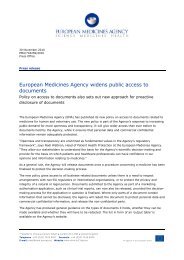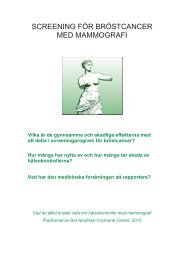1 Selective serotonin reuptake inhibitors (SSRI) â sales, withdrawal ...
1 Selective serotonin reuptake inhibitors (SSRI) â sales, withdrawal ...
1 Selective serotonin reuptake inhibitors (SSRI) â sales, withdrawal ...
Create successful ePaper yourself
Turn your PDF publications into a flip-book with our unique Google optimized e-Paper software.
The first two studies led to the third study about the drug authorities’ reactions to benzodiazepine<br />
dependence and <strong>SSRI</strong> <strong>withdrawal</strong> syndrome and the way drug authorities informed the health<br />
professionals and the public about possible adverse reactions. It seems reasonable to explore how<br />
drug authorities informed the public about <strong>SSRI</strong> <strong>withdrawal</strong> reactions, as drug authorities have the<br />
responsibility to protect the public against adverse reactions. Joel Lexchin has written that, “Drug<br />
regulation would seem to be an easy task: make sure that the drugs that reach the public are safe and<br />
effective, and ensure that accurate information is provided about how to use these medications”<br />
(26). We raised several questions about drug regulation in our first two studies, but in the third, we<br />
focused on drug regulation and information about <strong>SSRI</strong> <strong>withdrawal</strong> and benzodiazepine dependence<br />
and on whether the information could be understood from a precautionary principle or a risk<br />
management principle, as described by Lexchin (26).<br />
Drug agencies have the responsibility of protecting public health and have the authority to inform<br />
about drugs, both with respect to efficacy and to adverse effects. The information from drug<br />
agencies is important for patients, allowing them to make an informed choice, and for the decisions<br />
of prescribers. The society has an expectation that drug agencies will offer neutral and<br />
comprehensive information about drugs. Pharmacovigilance activities aim to protect public health<br />
(including regulatory action) and to communicate with and inform stakeholders and the public (27).<br />
In this thesis one focus is on the use of <strong>SSRI</strong>s and the changes in use compared to benzodiazepines<br />
and in the light of the use of all psychotropic drugs. The other focus is on dependence or <strong>withdrawal</strong><br />
reactions, which have been claimed by users of the drugs and rejected by the drug authorities and<br />
the manufacturers (21).<br />
The suspicion of <strong>SSRI</strong> dependence was raised a few years after their marketing through the<br />
adverse-event reporting system. Nevertheless it has consistently been denied that the <strong>SSRI</strong>s could<br />
lead to dependence, both by marketing-holders, clinicians and authorities (28,29). When patients<br />
abruptly stop taking either benzodiazepines or <strong>SSRI</strong>s, the result is often a constellation of<br />
symptoms. However for benzodiazepines, this condition is labelled “dependence”, but for <strong>SSRI</strong>s<br />
“<strong>withdrawal</strong>” reactions (28,29).<br />
13





